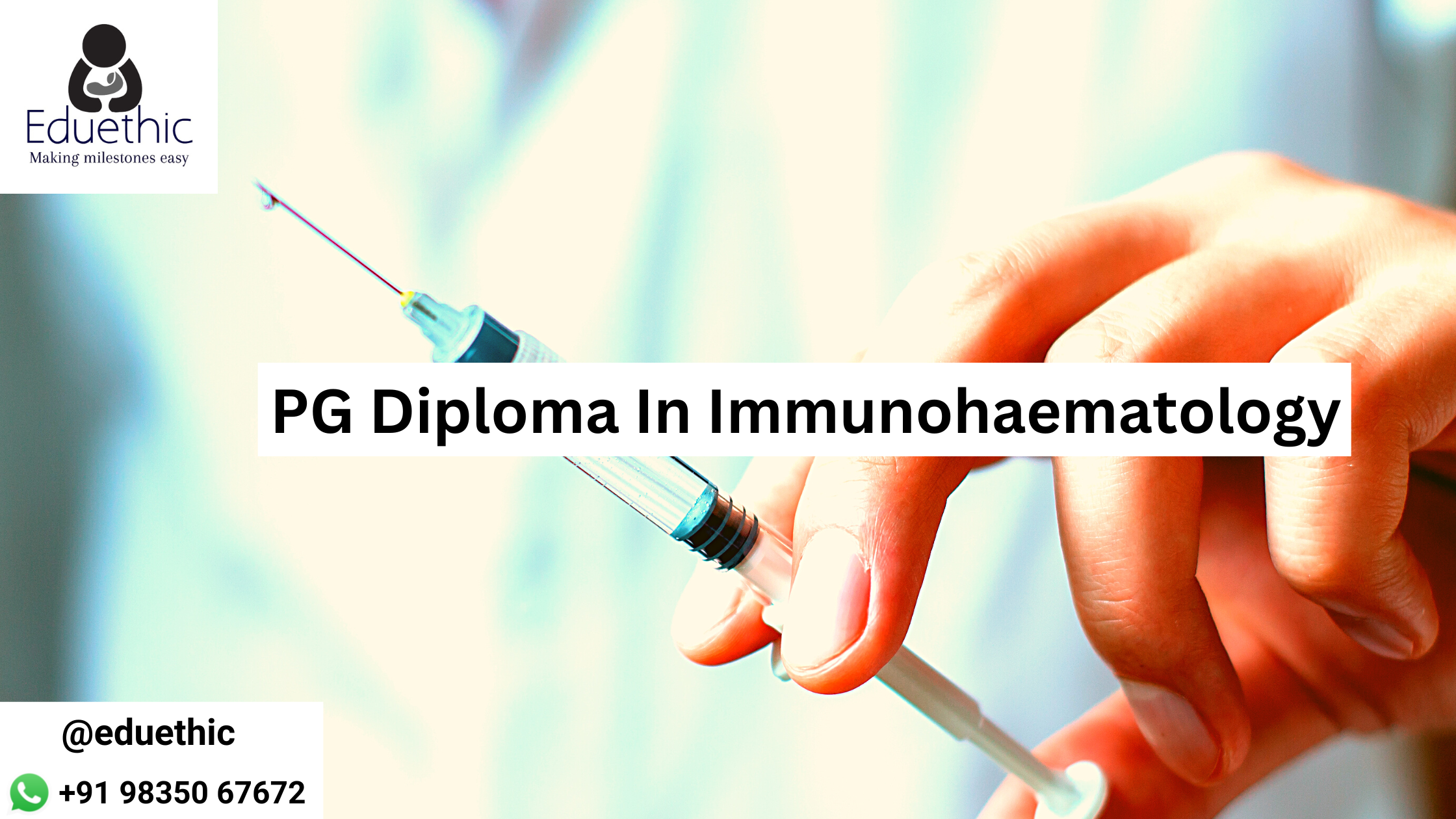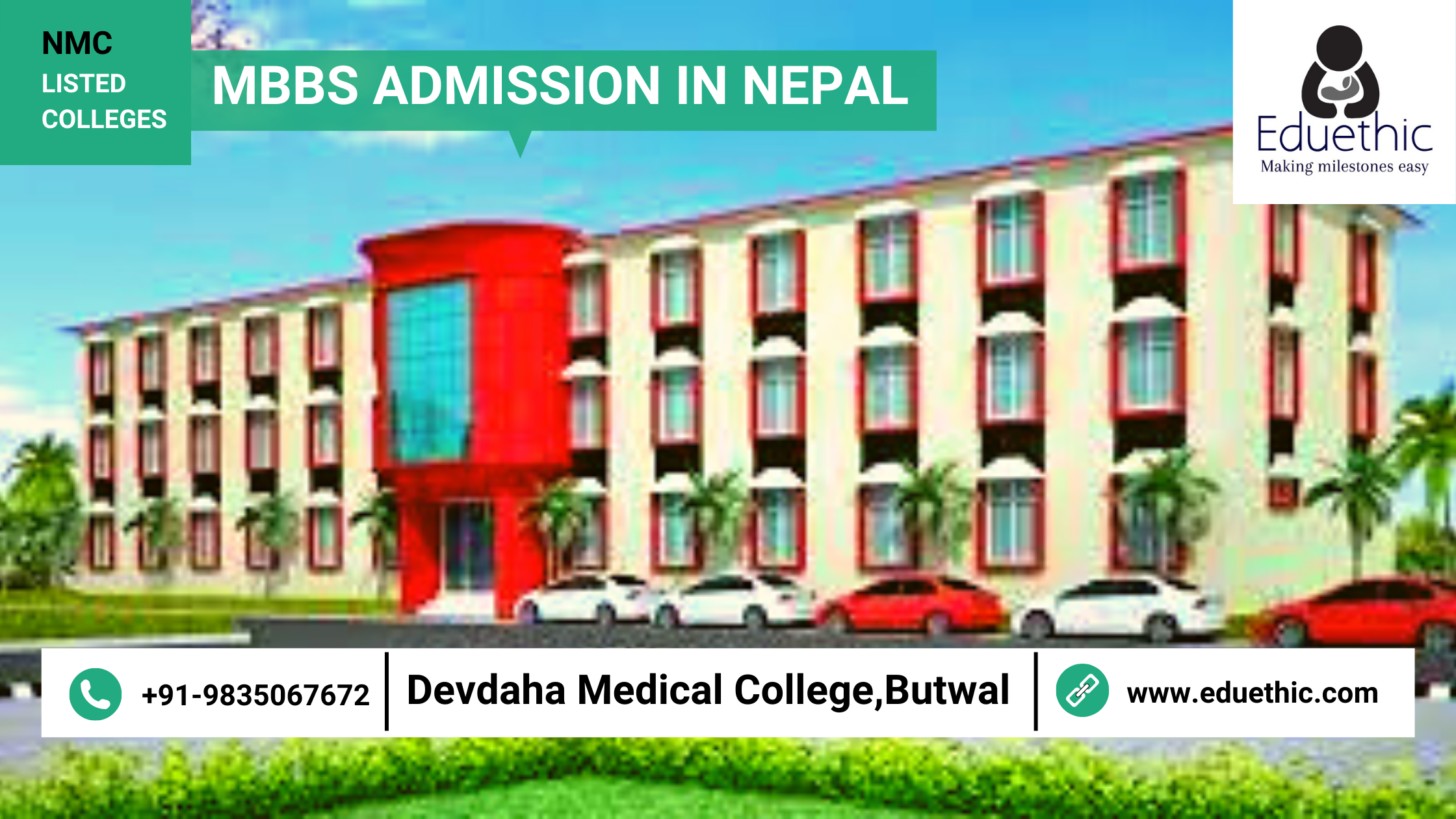PG Diploma In Immunohaematology: Admissions,Medical Colleges, Eligibility Criteria
By: Eduethic
Introduction
Post-Graduate Diploma in Immunohaematology, also known as Diploma in Immunohaematology, is a Postgraduate level course for doctors in India that they do after completing their MBBS. The duration of this postgraduate course is 2 years, and it focuses on the study of various concepts related to the field of interactions between the immune system and blood.
Warning: Undefined array key "blogDesc" in /www/wwwroot/eduethic.com/blog_view.php on line 264
Deprecated: chop(): Passing null to parameter #1 ($string) of type string is deprecated in /www/wwwroot/eduethic.com/blog_view.php on line 264
Post-Graduate Diploma in Immunohaematology, also known as Diploma in Immunohaematology, is a Postgraduate level course for doctors in India that they do after completing their MBBS. The duration of this postgraduate course is 2 years, and it focuses on the study of various concepts related to the field of interactions between the immune system and blood. It deals with the characteristics of the transfusion of blood and blood components; it deals with the diagnosis of blood disorders.
The course is a full-time course pursued at Sher-I-Kashmir Instt. Of Medical Sciences, Srinagar.
Admission to this course is made through the NEET PG Entrance exam conducted by the National Board of Examinations, followed by counselling based on the exam scores that DGHS/MCC/State Authorities conduct.
The fee for pursuing Post Graduate Diploma in Immunohaematology varies from college to college and may range from Rs. 15,000 to Rs 24,00,000 per year.
Also Read - MCC NEET PG Counselling 2022: 176 MD, MS, DNB Seats Added To Round 2
After completing their respective course, doctors can either join the job market or pursue higher degree courses like master's degrees and research degree courses recognized by NMC, where Post Graduate Diploma in Immunohaematology is a feeder qualification. Candidates can take decent jobs as Senior residents, Junior Consultants, Consultants etc., with an approximate salary range of Rs. 12,00,000 to Rs. 14,00,000 per annum.
Also Read- NEET MDS 2022 Cutoff Percentile Lowered
What is a Post Graduate Diploma in Immunohaematology?
- Post-Graduate Diploma (PG Diploma) in Immunohaematology, also known as Diploma in Immunohaematology, is a two-year postgraduate programme that candidates can pursue after completing MBBS.
- Immunohaematology is the branch of medical science that studies interactions between the immune system and blood.
- National Medical Commission (NMC), the apex medical regulator, has released guidelines for a Competency-Based Postgraduate Training Programme for Post Graduate Diploma in Immunohaematology.
- The Competency-Based Postgraduate Training Programme governs the education and training of Post Graduate Diploma in Immunohaematology.
- PG education intends to create specialists who can contribute to high-quality health care and advances in science through research and training.
The required training done by a postgraduate specialist in the field of Immunohaematology would help the specialist recognize the community's health needs. The student should be competent to handle medical problems effectively and aware of the recent advances in their speciality.
The candidate should be a highly competent Immunohaematologist with a broad range of skills that will enable her/him to practice Immunohaematology independently. The PG candidate should also acquire the basic skills in teaching medical/para-medical students.
The candidate is also expected to know the principles of research methodology and modes of the consulting library. The candidate should regularly attend conferences, workshops and CMEs to upgrade her/ his knowledge.
Also Read - NMC RENEWS APPROVAL FOR 100 MBBS SEATS AT MGM MEDICAL COLLEGE INDORE
Course Highlights
Here are some of the course highlights of Post Graduate Diploma in Clinical Pathology
|
Name of Course |
Post Graduate Diploma in Immunohaematology |
|
Level |
Postgraduate |
|
Duration of Course |
Two years |
|
Course Mode |
Full Time |
|
Minimum Academic Requirement |
MBBS degree obtained from any college/university recognized by the Medical Council of India |
|
Admission Process / Entrance Process / Entrance Modalities |
Entrance Exam (NEET PG) Counselling by DGHS/MCC/State Authorities |
|
Course Fees |
Rs. 15,000 to Rs 24,00,000 per year |
|
Average Salary |
Rs. 12,00,000 to Rs. 14,00,000 per annum |
Eligibility Criteria
The eligibility criteria for Post Graduate Diploma in Immunohaematology are defined as the set of rules or minimum prerequisites that aspirants must meet in order to be eligible for admission, which include:
- Candidates must have an undergraduate MBBS degree from any college/university recognized by the Medical Council of India (MCI).
- Candidates should have done a compulsory rotating internship of one year in a teaching institution or other institution recognized by the Medical Council of India (MCI).
- The candidate must have obtained permanent registration with any State Medical Council to be eligible for admission.
- The medical college's recognition cut-off dates for the MBBS Degree courses and compulsory rotatory Internship shall be as prescribed by the Medical Council of India (now NMC).
Admission Process
The admission process contains a few steps to be followed by the candidates for admission to Post Graduate Diploma in Immunohaematology. Candidates can view the complete admission process for Post Graduate Diploma in Immunohaematology mentioned below:
- The NEET PG or National Eligibility Entrance Test for Post Graduates is a national-level master's level examination conducted by the NBE for admission to MD/MS/PG Diploma Courses.
- The eligibility criteria for participation in counselling towards PG seat allotment conducted by the concerned counselling authority shall be instead of the Post Graduate Medical Education Regulations (as per the latest amendment) notified by the MCI (now NMC) with prior approval of MoHFW.
|
S.No. |
Category |
Eligibility Criteria |
|
1. |
General |
50th Percentile |
|
2. |
SC/ST/OBC (Including PWD of SC/ST/OBC) |
40th Percentile |
|
3. |
UR PWD |
45th Percentile |
Also Read- MD IMMUNOHAEMATOLOGY: ADMISSION PROCESS, FEES, ELIGIBILITY CRITERIA
Syllabus
Post Graduate Diploma in Immunohaematology is given in the Competency-Based Postgraduate Training Programme released by National Medical Commission, which can be assessed through the link mentioned below:
I. Blood donation
• Motivating factors for donation
• Whole blood donation vs apheresis donation
• Types: allogeneic, autologous, directed
• Donor questionnaire and interview: Eligibility and deferral criteria
• Donor reactions and their management
II. Blood component preparation, composition & storage
• Basic steps in component preparation and labeling
• Composition: volume, cellular, plasma and clotting factor content
• Storage conditions for components
• "Storage lesions"
• Quality control standards
• Specialized blood components - irradiated, volume reduced, CMV free, HLA matched
III. Plasma derivatives
• Basic principles of preparation & composition
• Recombinant clotting and hematopoietic growth factors
• Clinical indications and dosage
IV. Blood groups
• Biochemical structure of major blood group antigens
• Clinically significant blood group antibodies
• Properties and significance of naturally occurring vs unexpected antibodies
V. Pretransfusion testing
• Patient specimen labeling requirements
• Patient /component identification requirements
• ABO/Rh, Red cell antibody screen, Cross match
• Abbreviation of compatibility testing in emergency
VI. Transfusion indications
• Red blood cells, Platelets, Plasma/cryoprecipitate, Granulocytes
• Massive transfusion
• Metabolic complications
• Dilutional coagulopathy
• Switching ABO /Rh types
VII. Transfusion reactions
• Diagnosis, Pathophysiology, Treatment, Prevention
VIII. Infectious complications
• Bacterial, parasitic, viral, prions
• Current risk & Prevention strategies
IX. Transfusion therapy in special patients
• Hematology/Oncology
• Pediatric/neonatal
• Obstetric including intra uterine
• Cardiac surgery with CPB








 @2026| eduethic.com All Rights Reserved
@2026| eduethic.com All Rights Reserved